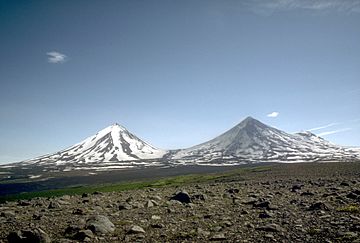Pavlof Sister facts for kids
Quick facts for kids Pavlof Sister |
|
|---|---|

Pavlof Sister (left), Mt. Pavlof (right) - July 1975
|
|
| Highest point | |
| Elevation | 7,027 ft (2,142 m) |
| Geography | |
| Location | Alaska Peninsula, Alaska, U.S. |
| Parent range | Aleutian Range |
| Topo map | USGS Port Moller B-6 |
| Geology | |
| Mountain type | Stratovolcano |
| Volcanic arc/belt | Aleutian Arc |
| Last eruption | 1786 |
Pavlof Sister is a stratovolcano located on the Alaska Peninsula. It is like a smaller companion peak to the much larger Mount Pavlof, sitting right next to it on the northeast side. The United States Geological Survey (USGS) gave the mountain its name in 1929.
Contents
What is Pavlof Sister?
Pavlof Sister is a type of volcano called a stratovolcano. These volcanoes are tall and cone-shaped. They are built up over many years by layers of hardened lava, ash, and rocks from past eruptions.
Where is Pavlof Sister Located?
This volcano is found on the Alaska Peninsula in the state of Alaska, United States. It is part of the Aleutian Range, which is a long chain of mountains and volcanoes. The Aleutian Range is part of the larger Aleutian Arc, a curved line of volcanoes formed where Earth's plates meet.
How Tall is Pavlof Sister?
Pavlof Sister stands at an elevation of 7,027 feet (about 2,142 meters) above sea level. It is considered a "satellite peak" because it is very close to and connected with a larger main volcano, Mount Pavlof.
Is Pavlof Sister Active?
Pavlof Sister is considered a dormant volcano. This means it is not currently erupting, but it could erupt again in the future. Its last known eruption happened a very long time ago, in 1786.
How is Pavlof Sister Monitored?
The United States Geological Survey (USGS) keeps an eye on volcanoes in the U.S. However, for Pavlof Sister, the volcano alert level is set to "unassigned." This means that the volcano is not being actively watched by monitoring equipment right now.
See also
 In Spanish: Pavlof Sister para niños
In Spanish: Pavlof Sister para niños
 | Isaac Myers |
 | D. Hamilton Jackson |
 | A. Philip Randolph |

